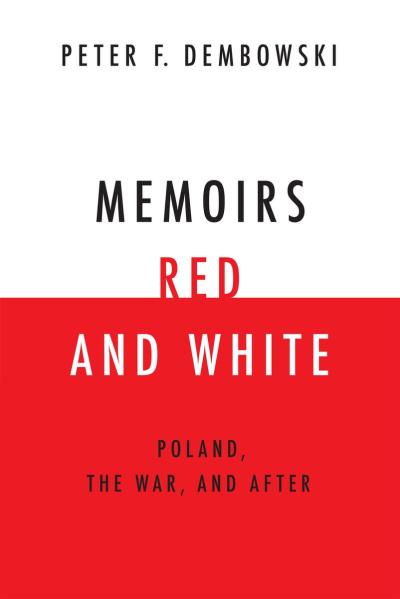| Title: | Memoirs Red and White - Poland, The War, and After |
| Writer: | Dembowski, Peter F. |
| Published: | University Of Notre Dame Press |
| Published in: | 2015 |
| Pages: | 216 |
| Language: | English |
| ISBN: | 9780268026202 |
| Review: | Peter Dembowski was born in Warsaw in 1925. He lost his mother and sister to the Nazis in 1942, fought in the Polish resistance, and spent time in Pawiak Prison and in a POW camp. After the war, he emigrated to Canada to start the next phase of his life. Red and white are the colors of the Polish flag, and his book of memoirs is divided into two sections: the red for his life in Poland and the war, and the white for his new life in North America. In addition to adding his own story to other writings on WW II, Dembowski wanted to counter the false Soviet-driven propaganda that the Polish resistance against the Nazis was inspired by Communists. Peter Dembowski, still a teenager, joined the Polish resistance (konspiracja) in Warsaw. When he was 19, Nazis rounded up everyone in his apartment building because of illegal weapons found there – weapons he himself had hidden. He and others were taken to Warsaw’s Pawiak Prison in April 1944. He looked young and acted as if compliant and stupid. After his unexpected release a month later, the teen then passed his high school exams. On August 1 he began participating in the Warsaw Uprising, which ended two months later with the resisters’ surrender. The terms of surrender included that the resisters would be considered combatants, protected by the Geneva Convention as prisoners of war (POWs). They were taken by train from central Poland to the large Stalag XB POW camp in Sandbostel, Germany. Dembowski describes many details of his experience there, including survival techniques and the "the most important fact of camp life" – hunger, due to a diet of 600 calories per day. After Liberation, he did not feel at home in Soviet-ruled Poland. Instead, he joined the Polish troops in Italy, then went to Canada. The intelligence, determination and adaptability that the young Peter Dembowski demonstrated during the war clearly served him well throughout his life. The journey of this survivor of multiple traumatic threats to his life progressed through emigration to North America, university study, teaching, marriage, children, and finally positions as faculty member and dean at the University of Chicago. After his wife died, he decided to write and share his story. His gratitude towards others was a recurring theme in his life in Europe and in North America. He died in Chicago in 2023 at age 97. Peter Dembowski completed his memoirs in 2014, 69 years after the end of the war. In an interview about his earlier writing about the Warsaw Ghetto,[1] he mentioned the pain of remembering. "Those of us who survived the war, we don't really talk about it, we're too ashamed. But now is the time to talk. There's not much time left for all of us, but there are still stories that need to be told, that nobody knows about."His stories add to the knowledge of resistance movements, the Warsaw Uprising, and life in a German POW camp. He seems to have taken care not to embellish, instead mentioning where his memory was less clear. For example, his chapter on the Warsaw Uprising begins, "I don’t remember much about the days before the Uprising. … What I do remember about the end of July 1944 was the rapid advance of the Red Army, the news accounts of the attempt on Hitler’s life, and the increasingly chaotic behavior of the German troops." Regarding his thoughts on the Soviet propaganda about communism’s role in the Polish resistance, Dembowski concludes that the resistance against the Germans started with the invasion of Poland in 1939: "The German occupation, based on the racist principles of Germanic superiority over the Slavic masses, practically forced us to organize and prepare for the struggle to reclaim Poland."After the 1943 destruction of the Warsaw Jewish Ghetto, the Nazi elimination of the Jews[2] meant that "the Germans would stop at nothing to eliminate the Poles as well." The following year, the Warsaw Uprising was timed to start when the presumed allies, the Soviets, reached the city. Instead, the Soviets stopped early (reasons unknown) and the Uprising failed, but the Soviets still credited the communists for the resistance. Dembowski goes further. He theorizes that the Soviet treatment of the Poles during the war permanently poisoned the relationship between the Soviets and Poles and other USSR countries. A sign of this, he writes, was that participants at the 70th anniversary of the Warsaw Uprising attributed the 1989 collapse of the Soviet Union to the behavior of the Soviets throughout the war, especially their failure to support the Uprising. I’ve read Memoirs Red and White because I had known the author decades earlier and knew he had stories to tell about his wide-ranging experiences as a young Polish man in WW II. At first I was disappointed that his written memoirs seemed dry instead of reflecting the vibrant man in his 40s whom I knew. But his straightforward, unadorned writing is powerful, and I was drawn into his narrative, wondering more than once how he managed to survive. The book’s detailed index allows readers easily to find his observations on a wide variety of topics. I recommend Peter Dembowski’s Memoirs Red and White for readers interested in the reflections of a bright, thoughtful man who excelled in his life in wartime Poland and in North America. |
| Rating: |      Excellent Excellent |
Notes
- Jennifer Carnig, " Burden of Memory is Lightened…," The University of Chicago Chronicle, April 27, 2006. Accessed 12 Jan 2024.
- An estimated 90% of Polish Jews were murdered during the war. Jewish Virtual Library, "Estimated Number of Jews Killed in the Final Solution," data from Yad Vashem and the U.S. Holocaust Memorial Museum. Accessed 01 Jan 2024.
Information
- Article by:
- Anne Palmer
- Published on:
- 21-04-2024
- Feedback?
- Send it!



